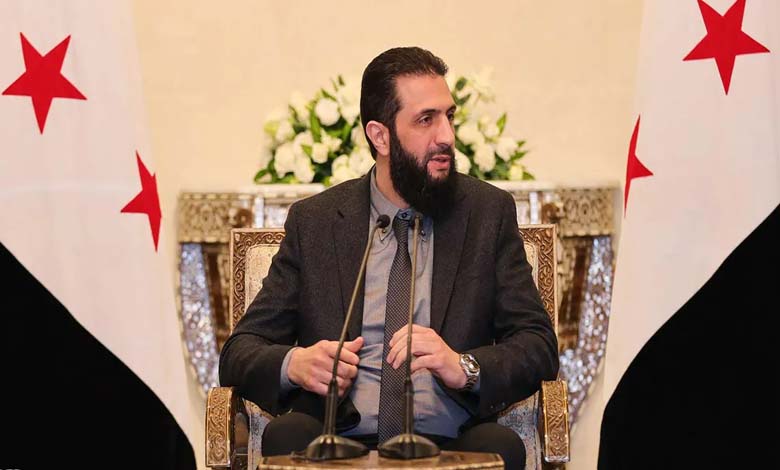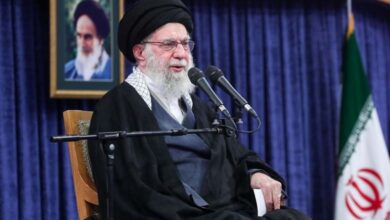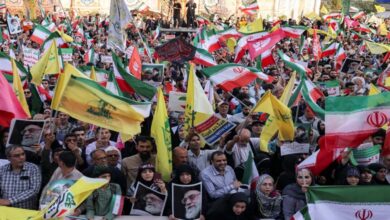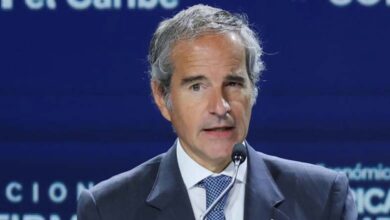Al-Sharaa Responds to Criticism of His Government: Satisfying Everyone Is an Impossible Task

Syrian President Affirms the New Government Reflects Syria’s Diversity Without Sectarian Quotas, Acknowledging the Difficulty of Satisfying Everyone Amid Kurdish Administration’s Criticism and Fears of Deepening Divisions
Transitional Syrian President Ahmed Al-Sharaa stated on Monday that the new government has taken into account the “diversity” of Syrian society, avoiding “sectarian quotas,” while acknowledging the difficulty of “pleasing” everyone. His remarks implicitly responded to criticism regarding the government’s composition, which saw key positions assigned to close associates, particularly from the Kurdish administration.
-
Will Al-Sharaa Renew His Relationship with the Muslim Brotherhood or Exclude Them from the Political Scene?
-
Formation of a New Armed Group to Confront Ahmed Al-Sharaa – Details
On Saturday night, a government of 23 ministers was announced, without a prime minister. While this new administration is more inclusive than the caretaker government that had been running the country since the overthrow of Bashar al-Assad more than three months ago, its formation has drawn criticism—most notably from the Kurdish self-administration. The Kurdish authorities have accused the new leadership of continuing to consolidate control in the hands of a single faction and have stated that they will not recognize its decisions.
The Kurdish administration, which holds strong control over northern and northeastern Syria with American and Western support, may view the formation of the transitional government as a step toward marginalizing its interests or limiting its political autonomy. This could exacerbate tensions among different factions in the country, potentially leading to ethnic or political conflicts.
-
The U.S. Administration and Syria: Caution and Skepticism Towards the New Regime Led by Ahmad Al-Sharaa
-
Al-Sharaa Pledges to Form an Inclusive Government in His First Speech to Syrians
Additionally, the Syrian president may face difficulties in aligning government policies with various local and international forces, which could impact the government’s effectiveness in addressing ongoing economic and security crises. Under these conditions, the government’s ability to fulfill its commitments remains uncertain, further complicating the country’s political landscape.
During a speech following Eid al-Fitr prayers at the People’s Palace, Al-Sharaa stated, “We have done our best to select competent individuals… We considered expansion, geographical representation, and the diversity of Syrian society. We rejected sectarian quotas but opted for participation” in forming the government and selecting ministers.
-
Qatar Fully Supports Al-Sharaa Administration
-
After 13 Years… Syria Regains Its Seat at the Organization of Islamic Cooperation
He added, “We chose individuals based on their competence and expertise, without ideological or political affiliations. Their sole focus is to build this country, and we will provide them with all the necessary resources to succeed.”
He acknowledged that “we cannot please everyone,” explaining, “Any steps we take will not achieve full consensus, and that is natural. However, we must strive for the minimum level of agreement within what is possible.” He described Syria as facing “a long and arduous road” but emphasized that the country possesses “all the elements necessary for its revival.”
-
The Fate of Syrian Officers in Iraq Depends on Agreements with Syria
-
A Secret Intelligence Deal between Turkey and Hayat Tahrir al-Sham… What Are the Details?
Sunnis constitute the overwhelming majority of the new government’s members, reflecting the demographic composition of a country that had been ruled for decades by the Assad family, which comes from the Alawite minority.
The government also includes four ministers from minority groups, who were assigned secondary portfolios: a Christian woman, a Druze man, an Alawite, and a Kurdish minister not affiliated with the Kurdish self-administration. The latter had reached an agreement with the new authorities in mid-March to integrate its institutions into the state, though some analysts fear this agreement may remain unfulfilled. Close allies of Al-Sharaa were appointed to key ministries, including foreign affairs, defense, interior, and justice.
-
Europe and Syria After al-Assad: “A New Political Beginning”
-
Key Leaders of the “al-Assad Regime”: Where Are They Now?
On Monday, the European Union welcomed the formation of the new Syrian government, expressing its willingness to “cooperate” with it. EU foreign policy chief Kaja Kallas and other officials stated in a joint declaration that “the European Union is ready to collaborate with the new government to help it address the enormous challenges ahead.”
Meanwhile, the United States called the formation of the government “a positive step” but emphasized that sanctions relief would not be considered unless progress is made on key priorities, such as counterterrorism efforts.
-
Syrian Coast Events: Commitment to “Accountability” and Arrest of Suspects
-
Syrian Kurds Plan to Empty Jihadist Camps by the End of the Year
The new administration hopes to complete the process of national reunification after 14 years of devastating war. However, analysts believe it faces significant challenges in reassuring all Syrian communities and gaining the trust of Western countries and the international community, particularly in efforts to lift sanctions.
After being declared transitional president in January, Al-Sharaa announced that the transitional period would last for five years, after which elections would be held under a new constitution.
-
Security Chaos Returns to Syrian Regions… Hayat Tahrir al-Cham Members Top the List of Accused
-
Washington Navigates the Syrian “Minefield”
Under the temporary constitutional declaration he signed on March 15, Al-Sharaa was granted full authority to form legislative, executive, and judicial bodies.
Human Rights Watch expressed concerns about these extensive presidential powers, stating that they “raise serious concerns about the continuity of the rule of law and the protection of human rights unless clear safeguards are put in place.”
On Monday evening, Al-Sharaa’s wife, Latifa Al-Droubi, appeared alongside him for the first time in an official capacity at the presidential palace during an Eid al-Fitr event. The couple welcomed “the children of martyrs,” according to images shared by the Syrian presidency on social media.












